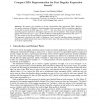Free Online Productivity Tools
i2Speak
i2Symbol
i2OCR
iTex2Img
iWeb2Print
iWeb2Shot
i2Type
iPdf2Split
iPdf2Merge
i2Bopomofo
i2Arabic
i2Style
i2Image
i2PDF
iLatex2Rtf
Sci2ools
135
click to vote
WAE
2001
2001
Compact DFA Representation for Fast Regular Expression Search
We present a new technique to encode a deterministic nite automaton (DFA). Based on the speci c properties of Glushkov's nondeterministic nite automaton (NFA) construction algorithm, we are able to encode the DFA using (m + 1)(2m+1 + j j) bits, where m is the number of characters (excluding operator symbols) in the regular expression and is the alphabet. This compares favorably against the worst case of (m+1)2m+1j j bits needed by a classical DFA representation and m(22m+1 + j j) bits needed by the Wu and Manber approach implemented in Agrep. Our approach is practical and simple to implement, and it permits searching regular expressions of moderate size (which include most cases of interest) faster than with any previously existing algorithm, as we show experimentally.
Algorithms | Deterministic Nite Automaton | Nite Automaton | Nondeterministic Nite Automaton | WAE 2001 |
Related Content
| Added | 31 Oct 2010 |
| Updated | 31 Oct 2010 |
| Type | Conference |
| Year | 2001 |
| Where | WAE |
| Authors | Gonzalo Navarro, Mathieu Raffinot |
Comments (0)

